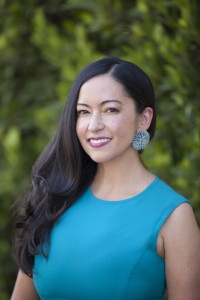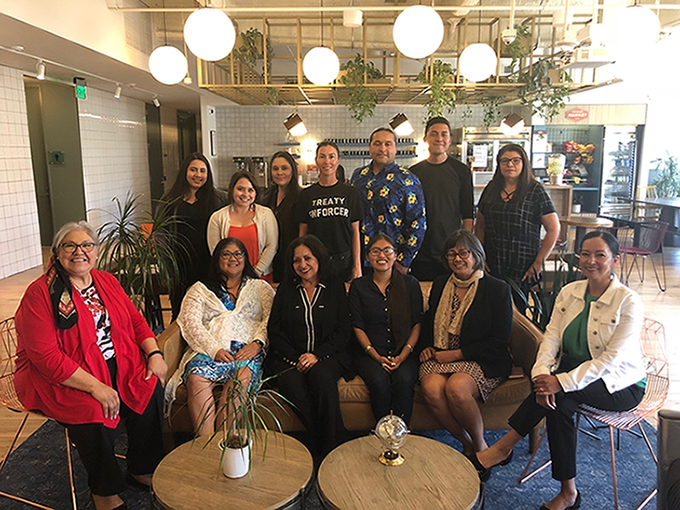Project Leader Chrissie Castro (end of the first row, far right) attends the census planning kickoff meeting with the California Indian Manpower Consortium, the California Complete Count Committee and the Tribal Liaisons of the Census Bureau.
The California Native Vote Project in 2016 set out to create ‘historic advancements’ in the fight for greater equity and political participation for Native people. In just this past year, their achievements have been nothing short of that ambitious goal.
That all California tribes received a total of only $16,500 to conduct outreach during the last US Census was just another glaring example of the stark inequities faced by Native communities, especially where participation and representation are concerned, according to Chrissie Castro, the founder of CA Native Vote Project.
“It was an insult to assume that a tribe would do all of this paperwork and outreach, and be accountable to the conditions of the contract with the state for that sum of money,” she said.
In preparation for the 2020 Census, Castro made it her project’s mission to ensure greater equity in the process for Native peoples through advocacy and education. They focused on political influencers by attending meetings with budget committees, the Complete Count Committees and with the Governor’s Tribal Liaison to advocate for more census outreach funding for Native communities. The group also sent out an advocacy letter detailing why Native communities should be counted by population size rather than housing units, and why more resources are needed to reach and count Native Americans.
Their efforts resulted in a monumental funding increase: $2 million dollars in funding was awarded to be split among California’s Tribal Governments, with a minimum of $5,000 for smaller tribes with 50 or less community members. “To their credit, when we spoke to policymakers about (past inequities in funding), they knew that it was wrong,” Castro noted. “But if we had not spoken up, I don’t know if anything would have been done about it.”
With that win under the belt, CA Native Vote Project applied for a grant with the 2020 Census and was awarded $400,000 in funding to work with fellow Native organizations to encourage, activate and educate Native populations who are least likely to be reached in the counting process. They also received another $120,000 from the California Community Foundation. This major new Census funding has enabled the project to expand into Northern, Central, and Southern California with three new program managers who each oversee a team of 10-25 outreach workers experienced in Native engagement efforts.
“It is so important to have Native people involved in processes that affect our community,” said Castro, “the decision-maker who allocated only $16,500 to an entire state didn’t know Native communities. But we do, and our involvement in this process is a huge win for us.”
 Castro herself is a longtime advocate for social justice generally and Native communities specifically. She not only started CA Native Vote Project, which she brought to Community Partners in 2018, but she also founded a national organization, Advance Native Political Leadership, and is the chair of the Los Angeles City-County Native American Indian Commission, among numerous other accomplishments.
Castro herself is a longtime advocate for social justice generally and Native communities specifically. She not only started CA Native Vote Project, which she brought to Community Partners in 2018, but she also founded a national organization, Advance Native Political Leadership, and is the chair of the Los Angeles City-County Native American Indian Commission, among numerous other accomplishments.
Castro stresses that fiscal sponsorship has been integral to her project’s success in managing their rapid growth and expansion of their services. “I’ve worked with many (sponsors) in the past, and without Community Partners, we wouldn’t have been able to grow as large as we have in such a short time. From the support that we get from the finance team around cash flow analysis to training us on how to read financial statements, to our program liaison organizing internally to help us gather materials for a big grant, and the availability of the HR director to have consultations with us whenever we’re in need of advice, I recognize that Community Partners’ services have benefited us tremendously.”
With their new funding in tow, CA Native Vote Project has been building a foundation for their outreach efforts. They want to ensure Native communities are counted in the 2020 Census, are informed of their right to vote and know whom they can contact should they experience voter suppression in the upcoming 2020 presidential election.
“We’re trying to transform the way our community sees civic engagement,” Castro explains. “We need them to see it also as voter engagement, and that voting is for us and that our vote counts.”





